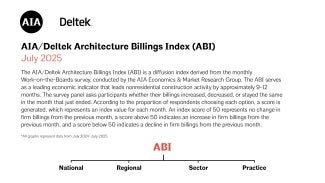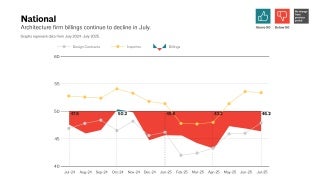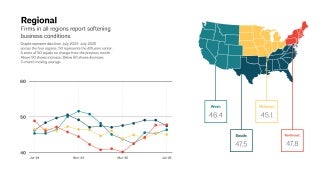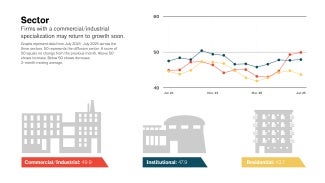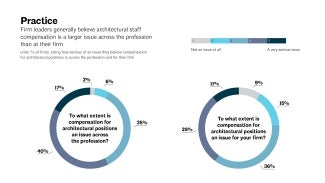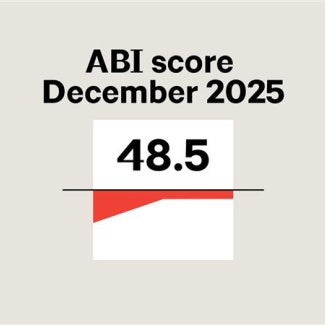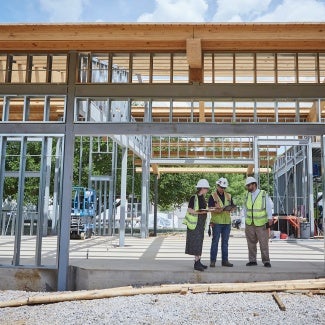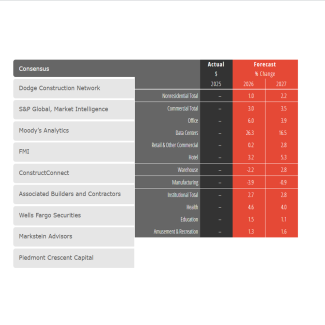ABI July 2025: Business at architecture firms remains soft
More than half of firm leaders think that architectural staff compensation is a serious issue across the profession.
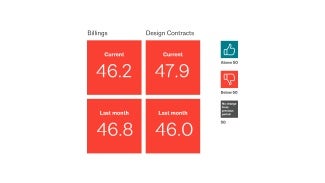
Business conditions at architecture firms remained soft in July
The AIA/Deltek Architecture Billings Index® (ABI) score for the month was below 50 for 31 out of the last 34 months, with a score of 46.2, as a majority of firms are still seeing declining billings. There are signs of hope ahead, as inquiries into new work grew slowly but steadily this month, following a brief three-month pause earlier this year. However, the value of newly signed design contracts at firms declined again in July, as firms continue to struggle to convert inquiries into contracts for new projects. This has been an issue for nearly as long as billings have been declining and reflects how soft business has been at many firms over the last two and a half years.
Billings continued to decline at firms in all regions of the country in July. Although conditions in the South looked like they were improving earlier this summer, the share of firms reporting a decline in billings increased this month. Billings remained softest at firms located in the Midwest for the third consecutive month. Business conditions continued to improve at firms with a commercial/industrial specialization this month, where there was nearly an equal share of firms reporting an increase in billings as reporting a decline for the second consecutive month. Firms with an institutional specialization also saw some encouraging signs, although business softened further at firms with a multifamily residential specialization in July.
A slowing job market and stubborn inflation contribute to a softening economy
Conditions have continued to soften in the larger economy in recent months. After the recent standard revisions to monthly employment figures, job growth in the country has been essentially flat since April, with just 73,000 new positions added in July. However, with recent strong growth, health care employment was a bright spot during that time. Architectural services employment has also grown slowly but steadily this year, adding nearly 1,000 new jobs since January. Employment in the industry stood at 204,100 in June (the most recent data available), the highest level in nearly a year.
Unfortunately, inflation also continued to increase at a steady pace in July. The Consumer Price Index (CPI) was up by 0.2% from June, and by 2.7% on an annual basis. The primary contributors to the increase this month were increases in the cost of shelter and food away from home, although energy and gas prices have continued to decline in recent months. With a slowing job market and even with this stubborn inflation, it seems likely that the Federal Reserve will lower interest rates modestly during its September meeting.
With concerns about compensation in the architecture profession, firm leaders turn to a variety of strategies to recruit and retain staff
In advance of the upcoming release of the 2025 AIA Compensation & Benefits Report in September, this month we asked firm leaders about compensation issues at their firm and in the profession as a whole. Overall, responding firm leaders thought that compensation for architectural positions is a more serious issue across the profession than at their own firm. More than half (57%) rated the seriousness as a 4 or 5 on a five-point scale ranging from “not an issue at all” (1) to “very serious issue” (5). In contrast to the 57% that rated the severity of the compensation issue as a 4 or 5 across the profession, just 40% rated it as a 4 or 5 at their firm.
When asked about the strategies used to recruit or retain staff at their firm, more than six in ten reported that they offer the flexibility to work remotely (63%) and/or provide mentoring or leadership training to develop future firm leadership (61%). An additional 55% reported offering performance bonuses, while 42% offer enhanced health benefits or other fringe benefits (above the industry average), 39% offer profit-sharing to architectural staff, and 28% offer compensation above market rate.
Finally, when asked to select the one single most important thing that the architecture profession could do to promote increased compensation levels across the profession, charging higher fees topped the list, and was selected by 37% of responding firm leaders. One quarter selected increasing the public perception of the importance of good design, while 11% selected operating firms more efficiently, 9% selected increasing staff productivity. And 7% selected improving the education and training of architectural staff. Few firm leaders thought that providing better management of architectural staff (4%) or utilizing more technology (e.g., AI) in the profession would help increase compensation levels (1%). These trends were generally consistent across firm demographics. However, smaller firms were significantly more likely than larger firms to select charging higher fees and increasing public perception as the most important factor. In comparison, larger firms were more likely to select operating firms more efficiently and increase staff productivity.
- Join us for FREE at the next AIAU live webinar, Economic Update: Q4 2025 ABI Insights, on Thursday, November 20, 2025, at 2pm ET.
This month, Work-on-the-Boards participants are saying:
- “Uncertainty is taking a toll on our clients and their ability to commit to long-term investments. Competition is fierce for the few large projects, so we have been piecing together more mid-size projects, which have been helpful in providing hands on training for developing staff.”—120-person firm in the South, institutional specialization
- “Steady but slowing. Not sure if this is the typical summer seasonal slowdown or if this is structural economic deterioration.”—40-person firm in the Northeast, commercial/industrial specialization
- “We are very busy. We could be taking on more work if we could find quality staff.”—1-person firm in the Midwest, residential specialization
- “We are seeing more inquiries for specialized healthcare work, but hearing about/seeing slowness in the general commercial area (office/retail).”—15-person firm in the West, institutional specialization
Join the ABI Work-on-the-Boards panel to participate in our monthly survey. Open to architecture firm owners, principals, and partners. All participants get a free ABI subscription.
The monthly AIA/Deltek Architecture Billings Index is a leading economic indicator for nonresidential construction activity.
Deltek is the home of AIA MasterSpec®, powered by Deltek Specpoint. Deltek helps A&E firms boost efficiencies while improving collaboration and accuracy.

